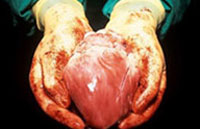Harvesting organs from dead bodies considered immoral, although it is essential
Organ transplant operations remain a very important problem for Russia to deal with. The problem is not only about medical complications of such operations. It is also about the attitude of the general public to the issue. Europe has a number of special programs, the goal of which is to explain the importance of donor organ transplant operations. The now-deceased Pope John Paul II approved and blessed transplantology as a perspective branch of modern medicine.

The problem of child organ donation is one of the most important problems of transplantology in present-day Russia. Russian laws do not allow the transplantation of human organs from one child to another. Russia’s Ministry for Healthcare and Social Development prepared a document to legalize the posthumous donation for children. The document is titled “Instructions to Pronounce Child’s Death on the Base of the Brain Death Diagnosis.”
The system of postmortem donorship will become effective only when the society is prepared to accept it. In Russia, many people believe that harvesting human organs is a criminal business.
The idea to replace defunct human organs with new ones like spare parts appeared a long time ago. Successful transplant surgeries became possible only during the 20th century, when scientists learned to suppress recipient’s immune system to prevent the rejection of an alien organ. The human body rejects the transplanted organ if the latter was not taken from a genetically identical organism.
Scientists discovered the mechanisms of immune reactions and learned to suppress them to let a donor organ take roots in a new body. Nevertheless, the coercive suppression of the immune system remains one of the most serious problems of modern transplantology. A patient remains vulnerable to infections after surgery. In addition, the steroids that are used to suppress the functions of the human immune system, produce a whole bouquet of side effects.
Modern medicine has mastered the transplantation of skin, kidneys, liver, heart, intestines, lungs, pancreatic gland, bones, joints, veins, heart valves and cornea. The first-ever successful operation to transplant a human hand took place in 1998. One of the most ground-breaking recent achievements in transplantology was made in France in 2005, when surgeons made a face transplant operation to a female patient. Chinese surgeons succeeded in the transplantation of the penis in 2006. The United States is the world’s leader in transplantology. US surgeons make 52 kidney, 19 liver and 8 heart transplant operations per a million of citizens.
The shortage of human organs is the major non-medical problem of transplantology. Thousands of people die as they wait for donor organs at hospitals. Scientists search for alternative sources of donor organs. The transplantation of animal organs to humans seems to be quite possible in theory, although the goal is very hard to achieve because a human being differs from animals greatly genetically.The only exception is the transplantation of heart valves from pigs to humans. It could be also possible to culture organs, or grow them outside the body in a nutrient solution, although it is a matter of the future.
The practical use of alternative sources of internal organs is still a matter of science fiction novels. Donors (dead or alive) are the major sources of organs for transplantation nowadays.
In accordance with Russian laws, a living donor is supposed to be a direct relative of a patient. This restriction is not necessary at all: any stranger can be a biologically compatible donor to an ailing person. For example, more than a half of Jesus Christians religious group members donated their kidneys to those who were desperately waiting for donor kidneys.
The trafficking of human organs is strictly forbidden in Russia, like in all other countries, save for Iran. The USA currently discusses the opportunity to legalize the market of organs. If only 0.06 percent of the US adult population sell one kidney of the pair, the quantity of donor kidneys will be enough for everyone who needs the organs for transplantation.
Needless to say that the legalization of the organ trafficking will lead to serious problems. Those people, who do not have access to high-quality medicine, may provide infected organs. There was an incident in 2007, when a recipient was infected with HIV and hepatitis C through a donor organ.
There are organs, which a living donor cannot donate – the heart, for example. Dead people make the second source of donor organs in transplantology today. Organs stay alive during a certain amount of time after death. Posthumous donorship is also connected with a number of serious problems – the legal definition of death and the need to receive relatives’ agreement to harvest organs.
It may seem immoral to harvest organs from a dead person without the agreement from his or her relatives. However, why would relatives need the internal organs of their deceased loved ones? The time, which is required to receive a written agreement from relatives of a deceased individual, may lead to tragedies. Some countries (Poland, Brazil, Spain, Italy, Russia and others) practice the implied consent as far and the harvesting of organs from a dead body is concerned.
The implied consent practice has recently been banned in Ukraine. The decision has virtually put an end to the harvesting of organs from dead bodies – relatives do not give their consent to that.
Over 80,000 people are waiting for organ transplant surgeries in the world at this very moment. The list grows every 13 minutes. Waiting kills 17 transplant patients every day.
The definition of brain death remains unclear still. Specialists say that the human brain dies about ten minutes after the cessation of blood circulation in it. It is worthy of note than any type of cardiac arrest was considered deadly a hundred years ago. However, there were incidents, when people stayed alive for a much longer time than ten minutes.
Subscribe to Pravda.Ru Telegram channel, Facebook, RSS!





